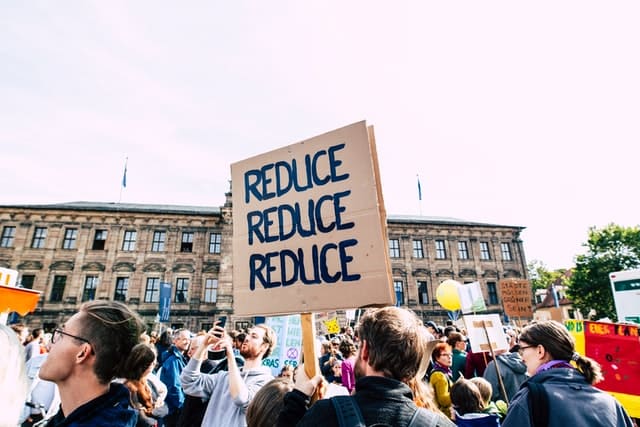At the very best, today’s capitalism needs reinventing to make sure we’re able to walk towards to healthier planet and fairer societies. Here’s why and how.
What Capitalism Has Brought Us and Why It Needs Saving
Capitalism is an economic system based on free initiative and free exchange.
It’s common sense that capitalism holds on to the idea of private property of the means of production (capital goods) which is explored through labor in the search for profit.
Capitalism is an economic system where private entities own the factors of production. The four factors are entrepreneurship, capital goods, natural resources, and labor.14
Together with the scientific and technological revolutions after the Industrial Age and the growth of democracies worldwide, capitalism played a major role in the “developments” over the last 200 years.
In this time period, the world’s GDP per capita grew over 13 times while the population’s average life expectancy nearly doubled – to around 80 y.o. – as did literacy rates worldwide – particularly primary school enrollment.
However, these and other developments came at a cost.
A cost many ignored while others only recently got conscious about: the collapse of the biosphere and our own ability to thrive in this planet as a species in the medium/long-term.
But that’s far from it.
As capitalism paid best to those with a higher (job) specialization, the population started moving to urban, shoreline, areas.
Covered by asphalt roads, large buildings, and some sort of competitive spirit, we started taking our basic needs for granted and our connection to the natural cycles started fading away.
The same happened, up to some point, to our cultural diversity as globalization kept standardizing a common type of lifestyle. Often ignoring inequalities and social exclusion phenomena.
As the side effects of capitalism come to the spotlight, people talk more about it and the term late-stage capitalism is becoming more popular.
Shortly put, late-stage capitalism stands for people’s frustrations with the failures – social, environmental, and even financial – of the capitalistic economy.
Hence why terms like “no ethical consumption under capitalism” or “saving capitalism” have skyrocketed on Google’s top searches over the last months and years.
But let’s take a look at capitalism’s “bad performance” by thinking about the jeans we’re wearing right now.
According to the UNEP, lifecycle assessments – which consider cotton production, manufacture, transport, and washing into account – indicate it takes 3,781 liters of water to make one pair of jeans.
The equivalent to around 33.4 kilograms of carbon equivalent emitted, or the same as driving 111 kilometers or watching 246 hours of TV on a big screen.
Numbers that don’t even account for the environmental pollution – of oceans or drinking water – of the plastic microfibres that are released when these jeans are washed.
Unfortunately, when we buy a pair of cheap jeans, these impacts – and others like the carbon transportation impact from production to the store or the workers’ fair wages – aren’t reflected in the price we pay.
Be it jeans, vegetables, furniture, tech devices, or cars – the same happens. Overall, we’re not paying for the ecological and social impacts – present and future – of most of the products or services we purchase.
This is one of capitalism’s main problems: it is focused on short-term profits and wealth creation. While failing to include a product’s impacts in how much they’re worth or sold for.
Ultimately, the price the market is willing to pay for these products is the only one that’s considered.
What’s the best way out of this?
- Related:
Capitalism That Accounts for Sustainability’s R’s

Old but gold: the 3R’s: reduce, reuse and recycle.
Moving quickly into a circular economy is imperative, as we’ve discussed in the article: The European Green Deal: Building It Based on What We Need Rather Than on Sustaining What We Want
Just consider that in 2019 the global economy consumed some 100.6 billion tonnes of natural resources – most of which weren’t renewable – while only 8.6% were recycled.
2019 was also a record year regarding greenhouse gas emissions. We’re talking about some 36.8 billion metric tons of carbon dioxide sent into the atmosphere.
Under the motto: measure what you treasure, the Footprint Network also showed that in 2019 humanity exceeded the threshold of Earth’s ecosystems annual renewal capacities earlier – in May – than ever before.
Meaning one planet is not enough to support our lifestyles: hence why the 3R’s are so important and urgent.
But they’re not enough.
- Related:
Reinventing Capitalism for a Healthy Planet and Fairer Societies
Besides reducing, reusing, and recycling – a maxim you might have heard some people with minimalistic lifestyles say, refusing what we don’t need is also crucial to a sustainable world.
And it is way more important than what you might think.
We must refuse a system that ignores the overexploitation of the planet and society, putting at risk the biosphere’s ability to self-regulate – and therefore our very own existence on this planet – and the social cohesion and democratic values that took so hard to conquer.
We must refuse to measure and value things only from a financial perspective and include social end environmental metrics.
While also exchanging short-term profit to a few for long-term profits to the many – which doesn’t have to exclude rewarding the entrepreneurial minds or investment institutions taking the risks.
In a way, it means acknowledging the Earth was a vibrant place before humanity was able to cause mass-scale changes; and adapting our expensive – in all ways – lifestyles to respect the boundaries Nature needs to operate healthily.
Rather than assuming we can keep our lifestyles because there will also be a fix-it-all technological solution – which often ends up causing further problems to be solved later on – around the corner to save us.
Don’t get me wrong.
We’ll need new technologies and materials to make solar panels more efficient, clothes last longer, or buildings and homes more efficient.
But a sustainable world will also need capitalism to bet on new business models tuned with the circular economy and new business models based on sharing and renting – the sharing economy – rather than on owning things only use for short fractions of time. Things like cars and holiday homes to drills, lawnmowers or stepladders.
All this while restoring the sense of community – and fulfillment and belonging – that we lost to our individuality and to the global competition somewhere along the way.
And to move from utopia to reality, all this needs to be backed up by huge large-scale education programs. But also by new political rules – from green incentives to a new regulation that’s able to stay lobby-free and new fiscal policies.
At the very best, it seems like it’s time to reinvent capitalism.
[Photos by Paul Fiedler and Markus Spiske on Unsplash]

